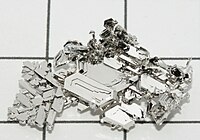
Photo from wikipedia
We report on the synthesis, characterization, and corrosion behavior of randomly oriented platinum–nickel and platinum–cobalt nanoparticles (PtNi-NPs, PtCo-NPs). Unsupported and carbon-supported nanocatalysts were synthesized using the “water-in-oil” microemulsion method. X-ray… Click to show full abstract
We report on the synthesis, characterization, and corrosion behavior of randomly oriented platinum–nickel and platinum–cobalt nanoparticles (PtNi-NPs, PtCo-NPs). Unsupported and carbon-supported nanocatalysts were synthesized using the “water-in-oil” microemulsion method. X-ray diffraction (XRD) was used to examine their average crystallite size, which was 2.3 nm in both cases. The shape, size, and size distribution of the nanoparticles were evaluated using transmission electron microscopy (TEM); they were determined to be spherelike with an average size of 3.3 and 3.2 nm for PtNi-NPs and PtCo-NPs, respectively, and a narrow size distribution. Comparison of the XRD and TEM data indicated that the nanocatalysts were polycrystalline in nature. Thermogravimetric analysis (TGA) measurements were carried out to evaluate the metal loadings of the carbon-supported nanocatalysts, which were 38.1 wt % for PtNi-NPs and 40.8 wt % for PtCo-NPs. Static Density Functional Theory (DFT) calculations were performed to ana...
Journal Title: ACS Applied Energy Materials
Year Published: 2019
Link to full text (if available)
Share on Social Media: Sign Up to like & get
recommendations!